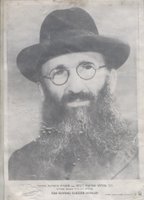Both of these ideas I hear from Rav Moshe Weinberger. The first idea I heard on Shavuos at his shul in 2005 (thanks to the genius of Mrs. Uberdox). The second idea he briefly touches on in his tape series on Bnei Machshava Tova.
Part I
A frum doctor once spent his vacation in Radin (home of the Chofetz Chaim). After a week of learning in yeshiva with bachrim he went to speak with the Chofetz Chaim.
The doctor said, I can’t believe how I’ve wasted my life. There’s nothing better than learning Torah. These yeshiva students I’ve seen are much closer to Hashem, than I’ll ever be.
The Chofetz Chaim responded: Which tree was closer to the center of Gan Eden: The Eitz HaChaim or the Eitz HaDaas? They were of equal distance.
The Chofetz Chaim went on to tell that doctor that by being a doctor has allowed him to help people have a refuah and he has saved countless lives. Each of us has a purpose and mission. Don’t think, said the Chofetz Chaim, that you are any further to Hashem than some of these students in Radin. We are all the same distance from Hashem, like both of the trees in Gan Eden.
Part II
Rav Weinberger says that he often asks people if they are eating from the Eitz HaChaim or from the Eitz HaDaas Tov v’Ra? He explains each of the following:
Eitz HaChaim: Is the joy of living a Jewish life and the love of being an eved Hashem. It’s the excitement we feel when we have a great davening or do chessed. It’s dancing on Simchas Torah or our tears at Ne’ilah. It’s grabbing mitzvah opportunities.
Eitz HaDaas Tov v’Ra: Is the ‘cheshboning’ that we each do for what we think are the ‘big decisions’ in our day. Should I go to shul #1 to daven or shul #2? Should I make time for a chevrusa? Should I help my wife at home? Is it really so important to give to this particular tzedakah?
When we take time time to over think and rationalize our actions we are eating from the
Eitz HaDaas Tov v’Ra.
Remember: You are what you eat! Good Shabbos Kodesh!






